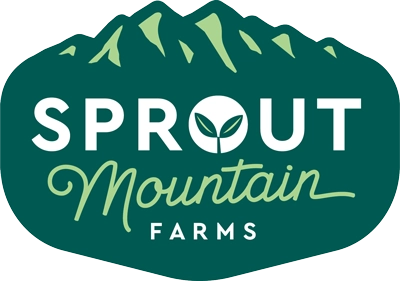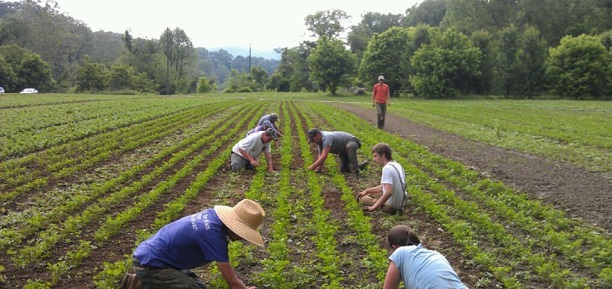Why Organic?
Sprout Mountain Farms believes in the virtues of organic agriculture. We also acknowledge that many great farmers and gardeners choose not to farm organically, or with a mix of organic and non-organic methods. We sincerely respect all farmers and believe it is each person's right to choose what growing methods are right for them in their unique situation.
Learn Why We Prefer Organic 🌱
Sprout Mountain Farms believes that growing food organically, in harmony with nature, will make the world a better place. Why is that? What is the point? Why can't you just use some miracle grow fertilizer and spray chemicals to keep insects and weeds from consuming the food before you do? Well you certainly can, but consider this first.
The environmental benefit of going organic is obvious: less toxic pollution, less soil degradation and erosion, less extermination of wildlife (yes, insects included - bees anyone?), and more biodiversity. We know that land simply has its limits of what it can handle, even with all of the artificial tools to pump it up or keep it productive, it cannot be exploited forever without losing its productive capacity at some point. If we continue poisoning the land and creatures living there, eventually we will run out of land, and we'll be up a creek with no food - err no paddle! Well, you get it...
The benefits of going organic on human health and well-being show up on many levels. First of all, organic food is more often grown in microbe-filled, nutrient-rich soil. By extension, organic food is more likely to contain higher amounts of vitamins and minerals compared with a corresponding non-organic alternative. Of course it's not that simple, but generally organic food is healthier. Not just because of the likelihood of higher nutrient density, but because it is lacking the pesticide and herbicide contaminants (residues) that show up in non-organic foods. Synthetic pesticides and herbicides are in general much more toxic, damaging, and persistent than the comparable tools available to organic growers. These "free radicals" in the body can provoke cancer or disrupt other vital body systems, even the brain, especially if they bioaccumulate from prolonged exposure.
Growing and Eating Organic also means avoiding GMOs. Some Genetically Modified crops are engineered to survive extreme applications of toxic pesticides and herbicides that would otherwise kill the plant along with the weeds if not for this special "modification". Key GMO crops like corn and wheat are doused with the herbicide multiple times, including just prior to harvest. Who washes off the chemicals? No one! Maybe rain? Well the grain needs to be dry to be harvested properly, so not really. The residual chemicals linger on the "freshly harvested" grain and enter right into the food supply. It's outrageous.
With the significant benefits to health through increased nutrient intake and reduced toxin exposure covered, we move into an interesting benefit of organic; that Organic Agriculture is intellectually and spiritually elevating. Think for a minute about how incredible nature is, how living organisms grow, multiply, and cooperate with each other in symbiotic relationships.
Nature's processes are so fantastically efficient. They really deserve to be studied, understood, and appreciated by us humans, the conscious inhabitants of this wondrous world. Organic Agriculture seeks for answers within the natural order of biology.
Rather than trying to dominate "Mother Earth" by literally going to war with the soil (or the bugs - which is admittedly tempting!), the Organic approach is to solve the difficult yet delightful puzzle of why there is a problem in the first place, using the science of nature as a guide.
It is certainly "easier said than done", but by partnering with nature instead of smashing it out of the way, the organic path raises your spirit and your knowledge at the same time! Organic farmers are brilliant innovators and experimenters and applicators of solutions. It takes patience, risk, a tolerance for failure, and an especially strong constitution to succeed at organic farming. It's more work! But you reap the benefits of becoming both brilliant and more in tune with our extraordinarily impressive natural system and the cosmic spirit that constructed it.
Sure, it is idealistic, but it is an ideal worth practicing because making the world a better place for all living things, along with oneself, is a worthy task! Now would it still be ideal to starve in order to maintain a strict organic discipline with regards to agriculture? Certainly not. But organic farming is not only possible, it is traditional! These methods are founded on principals such as crop rotation and animal waste fertilizer that societies have been using for millennia. How bad can they really be?
Organic agriculture methods and strategies are continually improving along with our growing understanding of how nature actually works. It's getting better and better all the time! As more farmers, gardeners, and eaters choose organic, the momentum behind the innovations grows too, and useful discoveries happen faster and faster.
Come on board the Organic Train and join this community! We aren't perfect by any means. Here at Sprout Mountain Farms, we are simply doing our part as best we can.
Thanks for reading, friends!
....

